Reviews
Stephen Herek
USA, 1989
Credits
Review by Katherine Follett
Posted on 06 August 2010
Source MGM DVD
Categories Favorites: Time Travel
Time travel can be an extraordinarily tricky concept. Even leaving out the advanced and maybe impossible physics required to accomplish it, its effects challenge some of our most basic and unsolvable philosophical conundrums. Is our future fated, or can we affect it? Are we bound by our actions in the past, or are small incidents relatively unimportant to the trajectory of our lives? If we were to set up a paradox, how would the universe resolve it? Ambitious time travel movies that take on these questions, not to mention the inevitable difficulties that arise when you have an infinitely malleable chronology, often get bogged down in logistical messes. On the other hand, cheap or lazy time-travel movies, even ones that hope to use time-travel with a light touch and bypass the big questions, end up making logical blunders or leaving gaping holes in causality or plot. The solution to these difficulties, as presented by Bill and Ted’s Excellent Adventure, is to make the premise, characters, and plot of the movie appear so innocuously stupid that it seems silly to bother with intellectual analysis. What results is a movie that is smart because it plays dumb.
Bill and Ted’s Excellent Adventure is silly right at the outset—actually, right from the title. But it isn’t long before this dumb movie becomes a “dumb” movie. Your first clue comes in the form of the late, great George Carlin, who opens with the deadpan lines, “Hi. Welcome to the future,” where there are “more excellent waterslides than any planet we communicate with.” Rufus is going on a mission from the future to save Bill and Ted’s band, Wyld Stallyns. If Ted “Theodore” Logan flunks history, his dad will send him to military school in Alaska, but Wyld Stallyns must be saved because their music aligns the planets, brings peace, and forms the basis for the future utopia, or something. In any case, Rufus must help them assemble a most triumphant history report so they can keep their band and all will be well.
This review may be the first in which anyone has over-thought the effects of time travel in Bill and Ted’s Excellent Adventure, and really, doing so is a mistake. For instance, things get weird when Bill and Ted discover near the end of the film that time travel eliminates the necessity of events happening in sequential order. Though Rufus has given them a deadline to complete their report (again, best not to think why. Doesn’t their time-traveling phone booth allow them to make it to school in time for their report at any moment? If they “miss” the deadline, why can’t they go back in time and make it?), the boys realize that they can travel to whenever they want after the report is complete, and come back to the “present” from the “future” in order to assist themselves. A series of perfect tricks follows, in which they find a host of assists left by their “future” selves (stash keys, a distraction for Ted’s mean dad, etc.). With this help, they sneak their historical figures past the authorities and complete their report. That they could go back a few hours farther and prevent the figures from running loose in the mall and getting arrested in the first place - or even go back and cheat on a history test or something, thereby getting out of danger of failing at all - is something that never occurs to them, and probably shouldn’t occur to the audience, either.
In fact, as with many time travel movies, whether serious or slight, the whole premise starts to fall apart if you think too much about it. If Rufus lives in the perfect “Wyld Stallyns” future, then how can that future possibly be threatened by Bill and Ted’s lives in the past? The Wyld Stallyns future exists, doesn’t it? But then again, the future also apparently has a mysterious panel of leaders that spends all its time wearing high-collared sparkly robes while floating endlessly on levitating chairs in an empty, blue-lit room just waiting for future-style things to happen on the floor in front of them. This film is probably banking on the fact that most of its audience will never think too much about causality, contradictions, and other ramifications of time travel. But the good news is, there are still rewards if you don’t.
The smart part of this movie, as should be expected from Critters director Stephen Herek, is the sly, if sweet humor. Socrates expounds to his followers, in Greek, that “like sands through the hourglass, so are the days of our lives.” Bill and Ted lure Genghis Khan from his harem with a Twinkie. Napoleon finds he’s a sucker for waterslides (specifically at the Waterloo water park. Duh). The film is also packed with quick pop references, from the traveling red phone booth that makes an obvious nod to Dr. Who to the farting cowboy scene in Blazing Saddles to Bill and Ted re-creating Luke and Vader’s light-saber battle from The Empire Strikes Back.
Bill and Ted themselves have the expected catchphrases and air-guitar, but the movie also makes a few jokes at their expense, signaling that the filmmakers were aiming for an audience smarter than the protagonists. Bill knows and uses the word “egregious” but can’t remember who Napoleon was. They overhear Socrates pronounce his own name, but Ted recommends they look him up under “Sow-crayts.” They hug each other, but then leap back with dismay and call each other “Fag!” which comes off more as a meta-joke about ignorance and homophobia than it does as homophobia itself.
This one line aside, Bill and Ted are remarkable for their constant cheerfulness, sweetness, and lack of cynicism. Compared to most depraved party-boy buddies, they are winningly innocent. Ted teases Bill about his young, hot stepmom not by making degrading comments, but by reminiscing, “Remember when we were freshmen and she was a senior?” The childishness of the comment makes the idea somehow funnier, and the film’s tone is as sweet as its characters, especially when the historical figures find themselves in the “present.” It’s not hard to see why this movie made Keanu Reeves a star. Critics quickly complained that he’s basically played some version of this character in every film since, but in Bill and Ted (and many of his other films, I would argue), that character is perfectly in place and totally believable. (You wonder why Alex Winter didn’t go on to similar lasting fame.)
As the boys’ history report is supposed to demonstrate what great figures of history might think of the bland-as-dust California suburb of San Dimas, the film is easily set up to be a savage satire. The movie is strongly rooted in this setting, with pointed references to Circle K, the mall, a waterslide park, and a general strip-developed anonymity. But it turns out that most historical leaders think of the 1989 LA suburbs much as Bill and Ted do—as a cool place to hang out. The best joke in the film, and one that sort of renews your faith in humanity, is that people from any time or place - from 1209 through the future utopia - are pretty much a bunch of goofballs in search of a good time, just like Bill and Ted. (Except for Napoleon. He was a dick.) Maybe it isn’t too far-fetched that Bill and Ted’s music leads to a perfect future, levitating chairs and all.
Excellent.
More Favorites: Time Travel
-

Bill and Ted’s Excellent Adventure
1989 -
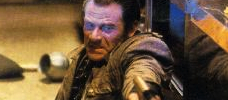
Trancers
1985 -

The Time Machine
1960 -

Groundhog Day
1993 -

Warlock
1989 -

The Navigator
1988 -
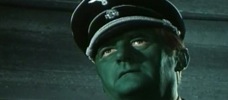
Tomorrow I’ll Wake Up and Scald Myself with Tea
1977 -

The Spirit of ‘76
1990 -
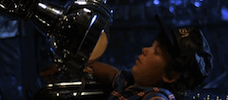
Flight of the Navigator
1986 -

La jetée
1962 -

Twelve Monkeys
1995 -

Beastmaster 2: Through the Portal of Time
1991 -
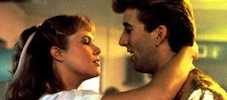
Peggy Sue Got Married
1986 -
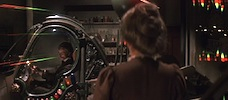
Time After Time
1979 -
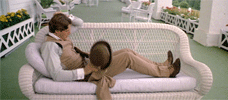
Somewhere in Time
1980 -

Back to the Future
1985 -

Back to the Future Part II
1989 -

Back to the Future Part III
1990 -
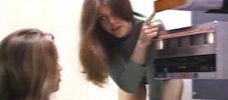
Idaho Transfer
1973 -
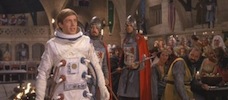
Unidentified Flying Oddball
1979 -

Slaughterhouse-Five
1972 -

The Lake House
2006 -
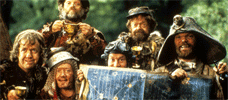
Time Bandits
1981 -

Doctor Who
1963–present -

Doctor Who
1963–present
We don’t do comments anymore, but you may contact us here or find us on Twitter or Facebook.



